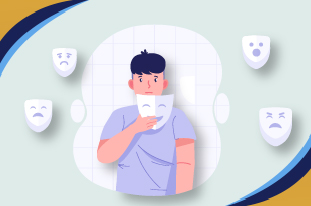Gender dysphoria is something that can be alarming for the sufferer and the sufferer’s family as well. Therefore, it is always best and advised to get your child or loved one treated on time to avoid any adverse impacts in the future. Gender dysphoria is something when a person does not connect with the gender based characteristic they have and their birth gender such as a girl may find it easy while being dressed in a boy’s attire and same goes for the other gender as well. Due to this unique behavior a person may feel discriminated, and left alone as many people do not consider this behavior normal. The main cause of concern is “How to cope with gender dysphoria?”.
If you desire to learn more on the impactful ways to treat gender dysphoria then continue reading this informative blog post.
Understanding Gender Dysphoria
Gender dysphoria is typically the psychological as well as physical state in which there is a contradiction in your desired and birth gender. More common terms referring to this state is transgender and non-binary individuals. Mental health experts firmly refer to the diagnostic statistical manual of mental disorders to diagnose mental health disorders. In case of gender dysphoria, some of the identifying signs are as follows:
- A notable distinction between you expressed gender and your birth gender
- A strong urge to not have the primary or secondary gender characteristic of the birth gender
- A strong urge to be a different gender
- A strong craving of being treated as the other gender
- A strong urge that you have the feelings and characteristics of the other gender
Read More: Top Facts About Gender Dysphoria You Should Know
Common Causes Of Gender Dysphoria
There is no single cause that triggers the signs of gender dysphoria in a person. The initial phase of gender dysphoria starts with certain biological changes that occur before birth. Another aspect of gender dysphoria is the anxiety and stress linked with distress led by societal stigmatization. This type of gender based psychological disorder can sometimes also lead to circumstances linked with verbal harassment and facial discrimination. A rough estimate shows that almost 1 in 4 are physically harassed, and 1 out of 10 experience sexual assault.

How Is Gender Dysphoria Treated Professionally?
Many people wonder “How to relieve gender dysphoria?”. The answer to your query lies in this section. The primary goal of therapeutic approaches available for overcoming the signs of gender dysphoria usually focuses on attaining mental peace, one thing to keep in mind is that the meaning of mental peace is different for every person. Moreover, this process requires patience as it takes a little time to attain the desired and optimal results. Consulting a healthcare expert with specialization in treating transgender issues is vital to explore the possible options. Some of the common gender dysphoria treatment options are as follows:
-
Gender Expression:
This certain type of therapeutic approach includes expression of your desired gender identity or undergoing medical therapies with certain surgeries. A sufferer may want to:
- Change their name and pronouns by which they are called by others.
- Amendment in the gender section in your government issued identification card such as your passport or driver’s license.
- Dressing in a manner that depicts the characteristics of the desired gender such as being more masculine, feminine, or even gender neutral.
- Making aesthetic changes such as addition or getting rid of facial hair.
-
Medical Treatments:
Some of the impactful therapies with involvement of gender affirming hormones include:
- Testosterone treatment for trans men emphasizing on increasing the masculinizing hormones in them.
- For the transwomen, testosterone blockers and feminine hormone enhancers such as estrogen and progesterone.
-
Gender affirming surgeries:
Another widely preferred and implemented method of gender affirmation is undergoing surgeries. Moreover, one thing to keep in mind while undergoing a surgery is that the changes caused by these surgeries are permanent and are more persistent with your desired gender. Furthermore, surgeries can also lead to mood disorders and Major Depressive Disorder, due to the discomfort. You may show a strong desire to choose top, bottom, and facial procedures.
- The top surgery usually involves addition and removal of breast implementation based on the gender.
- The bottom surgery is mostly removal of penis if a person desires to be a woman with the help of metoidioplasty or phalloplasty.
- On the other hand, in trans women, vaginoplasty is a method that helps in creating a vagina after the complete removal of penis and scrotum.
- Lastly, comes the facial procedures that help in attaining a more feminine face if a male desires to be a female. Same goes with the females who want to be a male, this certain type of facial procedure helps in growing facial hair and masculine features.
Read More: Can ADHD Cause Gender Dysphoria? An In-depth Study
What Major Role Does Mental Health Therapy Play In Gender Dysphoria Treatment?
Attaining a professional psychiatric help in many ways such as:
- Observing and addressing the negative feelings a person is experiencing.
- Learning different coping skills and various ways of thinking.
- As per a study, receiving counseling sessions and visiting the professional settings promotes lower occurrence of depression and anxiety (Nguyen et al., 2018).
An important question that often comes in the mind of sufferers is that what does the therapy include:
- Accurate medication management includes prescription of certain medications that help you to have a better control on your anxiety and depression or any other related psychological issues such as specific phobia, and acute stress etc. Moreover, it comes under the best gender dysphoria coping skills.
- Implementation of emergency counseling if you have feelings of crisis and suicidal thoughts.
Is There Certain Support Available For Gender Dysphoria People?
We all are aware of the fact that people experiencing signs of gender dysphoria are often seen depressed and anxious due to the discrimination and societal pressure they experience. Therefore, in such times you are advised to join certain support groups. Now, what is the benefit of joining these support groups? The best benefit of such an act is that you will learn from the experiences of other people dealing with gender dysphoria about how they have tackled the situation of bullying and discrimination.
How To Help Someone With Gender Dysphoria?
There are certain ways which can be helpful for the people suffering from gender dysphoria and also provides them answers on “How to cope with dysphoria?”.
- Such people feel important when they are listened to.
- Two things hold a great importance in the lives of gender dysphoria’s one is validation and the other is acceptance.
- Avoid pressurizing the sufferer from changing their choice as it will also prevent the chances of manifestation of other mental health issues such as Bipolar Disorder, and ADHD in some individuals.
- Calling them with their desired names.
- Seeking counseling sessions if you feel like they are experiencing suicidal thoughts and self harming behaviors.
Read More: Hypersexuality and ADHD: What’s the Connection?
Bottom Line!
Gender dysphoria is something that is common but known by few people. A person suffering from gender dysphoria almost all the time has one thought “How to cope with gender dysphoria ftm?”. The hidden reason behind such complexities is the pressure built up by the society and the idea of considering it as something abnormal. Much importantly, it is a wise step to receive professional mental health support. After reading this blog post if you think it’s you or someone you know then refer to telehealth services of Orange Coast Psychiatry.
























